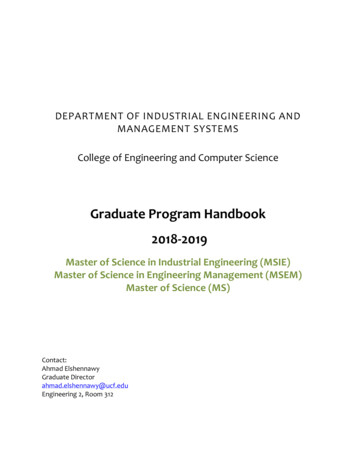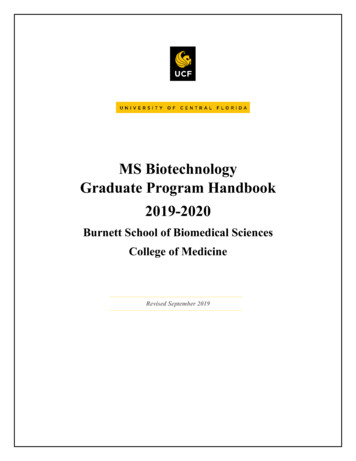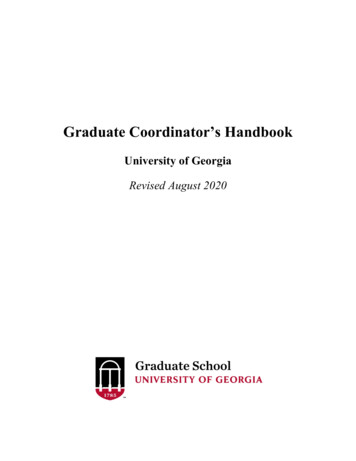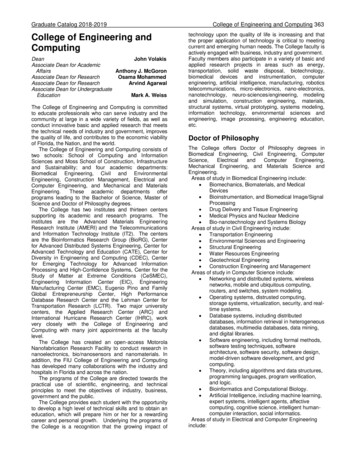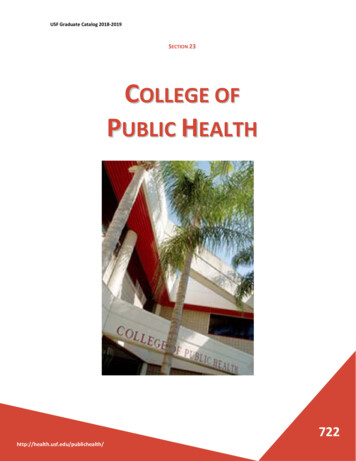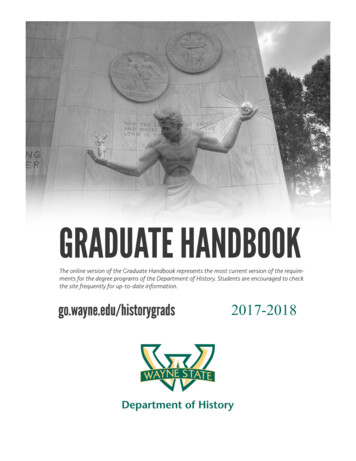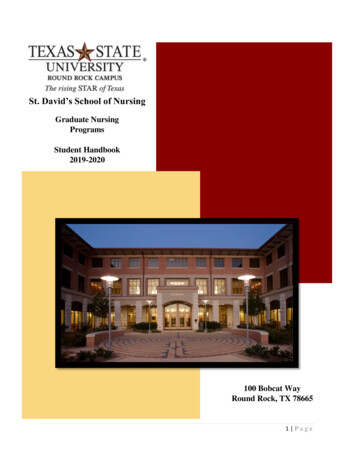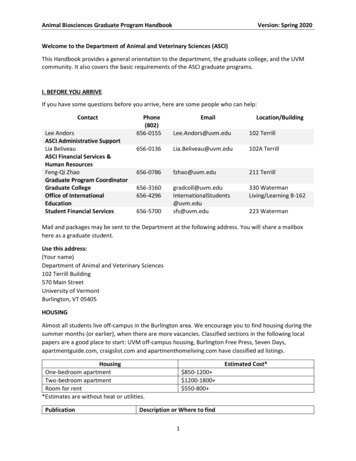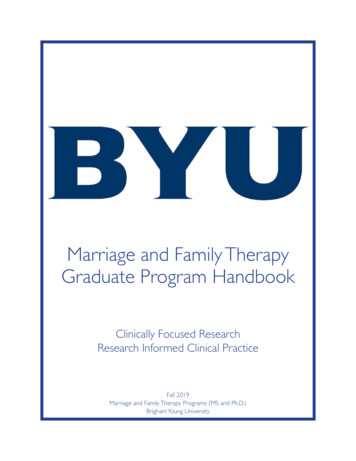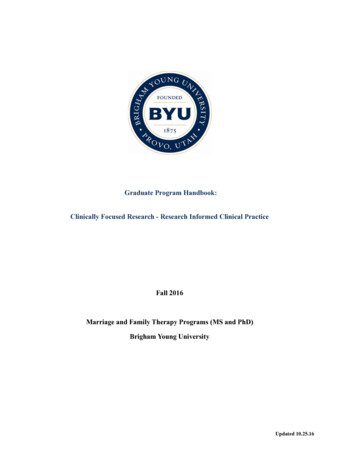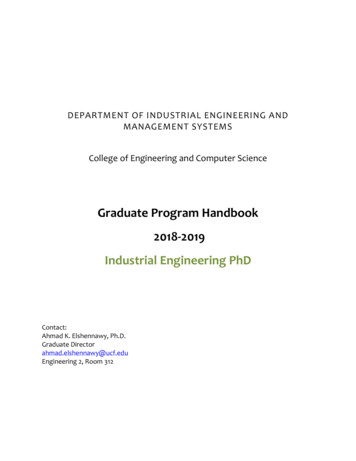
Transcription
DEPARTMENT OF INDUSTRIAL ENGINEERING ANDMANAGEMENT SYSTEMSCollege of Engineering and Computer ScienceGraduate Program Handbook2018-2019Industrial Engineering PhDContact:Ahmad K. Elshennawy, Ph.D.Graduate Directorahmad.elshennawy@ucf.eduEngineering 2, Room 312
Graduate Program Handbook 2014-2015Industrial Engineering PhDINDUSTRIAL ENGINEERINGIndustrial Engineering and Management Systems is the engineering discipline that focuses on thedesign, management, and improvement of systems, products, and processes. Industrial engineersand engineering managers use many analytical approaches to improve productivity, safety, andquality of working life while reducing operating costs; they work to continuously improve the designof systems, processes, or products; and they design systems that translate a specific product designinto a physical reality in the most productive manner and with highest possible quality. Industrialengineers and engineering managers are needed in all industry sectors such as manufacturing,healthcare, entertainment, information technology, and many others. The industrial engineer andengineering managers are responsible for making decisions regarding the utilization of people,materials, machines, and automation (including robotics). Industrial engineers and engineeringmanagement graduates are also skilled in Engineering Economic Analysis and InformationManagement, since they are generally considered to be the natural interface between the technicalspecialist and business management personnel.The Industrial Engineering approach is characterized by a systematic evaluation of alternatives usingquantitative analysis, modeling, physical and computer simulations. As such, quantification andmeasurement play a key role in the day to day activities of the industrial engineer.ADVISING AND MENTORINGThe IEMS Graduate Program Director is assigned as the Graduate Advisor for all students firstentering IEMS Master’s and Doctoral programs. During the course of study, a student may develop aworking relationship with a faculty member in the area of study he/she is pursuing and may requestto the Graduate Advisor that the faculty member be assigned as his/her advisor.A Master’s or Doctoral student who pursues the thesis option or dissertation, respectively, will beresponsible for developing the thesis/dissertation topic and convincing the potential advisor that it isa worthy topic and that the advisor should be willing to commit significant time to advising thestudent on the topic.The student, with the guidance of the advisor, next identifies other faculty members to serve asThesis Advisory Committee, consisting of at least three members who are approved members of theGraduate Faculty or Graduate Faculty Scholars (www.graduatecatalog.ucf.edu/gradfaculty/). This
committee will recommend to the Dean of the college regarding the student's program of study,provide continual guidance for the student, and be the principal mechanism for the evaluation of thestudent's thesis and performance in any general examinations. At least two members of the ThesisAdvisory Committee must be Graduate Faculty, one of whom must serve as the chair of thecommittee. Graduate Faculty Scholars may serve as a member or co-chair of a thesis advisorycommittee but may not serve as the chair.The recommended course of action is to involve the committee members early in the process. Thisgives the student the advantage of being able to make use of his/her advisors expertise and avoidsany surprises when the student may think the thesis/dissertation is completed.The thesis/dissertation committee must be formed prior to the student registering forthesis/dissertation hours. With the case of a thesis committee, the chair of the committee and oneother member must be from the IEMS Department. With a dissertation committee, three membersmust be from the IEMS Department, and one must be from outside the Department.Committee membership must be approved by the program director and submitted to the College ofGraduate Studies. All members must be in fields related to the thesis topic. The UCF College ofGraduate Studies reserves the right to review appointments to a Thesis Advisory Committee, place arepresentative on any Thesis Advisory Committee, or appoint a co-chair. A student may request achange in membership of the Thesis Advisory Committee with the approval of the program directorand re-submission to the College of Graduate Studies.For further information on advising policies, please see the Students Advising and Mentoring link onthe College of Graduate Studies Graduate Student Handbook site.INTRODUCTIONTogether, the Graduate Student Handbook and your graduate program handbook should serve asyour main guide throughout your graduate career. The Graduate Student Handbook includesuniversity information, policies, requirements and guidance for all graduate students. Your programhandbook describes the details about graduate study and requirements in your specific program.While both of these handbooks are wonderful resources, know that you are always welcome to talkwith faculty and staff in your program and in the Graduate College.DEPARTMENT/GRADUATE ADMINISTRATIONChair of the Department:Waldemar Karwowski, Ph.D., D.Sc., d.h.c, P.E., C.P.E.; ENG II Room 312-D, (407) 823-0042.E-mail: wkar@ucf.eduAssociate Chair and Graduate Director:Ahmad Elshennawy, Ph.D., CLSSMBB, ASQ CQE, CRE; ENG2 Room 312-C, (407) 823-5742.E-mail: ahmad.elshennawy@ucf.edu
Administrative Staff Liz Stalvey, Coordinator, Administrative Services and Assistant to the Chair, ENG2 312-E, (407)823-5759, E-mail: Liz.Stalvey@ucf.eduRicardo Scuotto, Graduate Program Assistant, Eng. II – 312-G, (407) 823-0231E-mail:Ricardo.Scuotto@ucf.edu
PROGRAM DESCRIPTION:The Doctor of Philosophy in Industrial Engineering is primarily intended for a student with a master’sdegree in Industrial Engineering or a closely related discipline.The PhD program is designed to produce highly skilled researchers with both broad knowledge ofindustrial engineering and in-depth knowledge of specialty fields for careers in academia, industry,and government. The program allows a candidate to thoroughly study some aspect of industrialengineering, such as engineering management, systems operations and modeling, quality systemsengineering, interactive simulation and training systems, systems engineering, and human systemsengineering/ergonomics.The Industrial Engineering program is structured to support the emergence of Central Florida as anational center of high technology as well as supporting the diverse service industries in the regionand throughout the nation.Students in the Industrial engineering Ph.D. program can register for courses and do research indifferent areas such as:Human Systems Engineering/ErgonomicsAs technology has become more sophisticated, the need to design for the human user hasbecome more difficult, yet even more important. Human engineering and ergonomics assist inensuring that as technology advances, the abilities, limitations, and needs of humans areconsidered in the system design. This not only supports the needs of the user, it also optimizesthe efficiency and usability of the system designed. Traditionally, ergonomics has beenassociated with biomechanical issues and work measurement and performance issues in physicalsystem design, as well as occupational and industrial safety. The broader focus of humanengineering encompasses those issues as well as incorporating the reaction and effectiveness ofhuman interaction with systems, both physical systems and virtual systems such as computerbased models.Research in the Human Systems Engineering and Ergonomics area provides students with thenecessary knowledge in human engineering and ergonomics to effectively design tasks,industrial systems, and work environments that maximize human performance, safety, andoverall productivity.Interactive Simulation and Training SystemsThe Interactive Simulation and Training Systems research within the Industrial Engineering PhDprogram focuses on providing a fundamental understanding of significant topics relative tosimulation systems and the requirements, design, development, and use of such systems forknowledge transfer in the technical environment. Courses in this area address the evolving andmultiple discipline application of interactive simulation by providing a wealth of electives tosupport development of individual student interests and talents. In conjunction with UCF’sInstitute for Simulation and Training, industrial organizations involved in simulation in the CentralFlorida region, military organizations, and other governmental organizations, ISTS research in
the PhD program provides exposure to both military and commercial interactive simulation andtraining systems.The emphasis is on the application and development of interactive simulation and trainingsystems to meet various requirements including, but not limited to: simulators, skill trainers,organizational learning systems, computer and web-based interactive simulation systems andother novel interactive simulation efforts.Management Systems/Engineering managementThe Management Systems/Engineering Management research focuses on providing theknowledge for improving organizational systems. Engineering Management focuses on effectivedecision-making and successful project delivery in engineering and technologicalorganizations. With technological advancements comes a new level of organizationalcomplexity. As a result new knowledge is needed to help the technical organization understandhow to improve. The Management Systems/Engineering Management studies and research inthe Industrial Engineering program are intended for individuals of all engineering disciplines.Research and coursework focus on a systems view of engineering problems related to themanagement of complex industrial, military, government, and social systems.Operations ResearchThe Operations Research courses in the Industrial Engineering PhD program uses mathematicsand computer-based systems to model operational processes and decisions in order to developand evaluate alternatives that will lead to gains in efficiency and effectiveness. Drawing onprobability, statistics, simulation, optimization, and stochastic processes, Operations Researchprovides many of the analytic tools used by industrial engineers as well as by other analysts toimprove processes, decision-making, and management by individuals and organizations.Quality Engineering and ManagementQuality Engineering research in the Industrial Engineering PhD program focuses on providing theknowledge for improving product and process quality in manufacturing and service industries.Quality Systems Engineering provides both the quantitative tools for measuring quality and themanagerial focus and organizational insight required to implement effective continuousimprovement programs and incorporate the voice of the customer. The Quality SystemsEngineering courses provide the necessary knowledge to plan, control, and improve the productassurance function in government, military, service, or manufacturing organizations.Simulation Modeling and AnalysisThe Simulation Modeling and Analysis research and studies in the Industrial Engineering PhDprogram focus on providing a fundamental understanding of the functional and technical designrequirements for simulation in manufacturing and service industries. Research in this area isbased on a systems modeling paradigm and provides coding and development capability in thecontext of a broader systems framework. Significant exposure to design and analysis aspects is acore element of the track.
Systems EngineeringIntelligence is being infused into everyday systems, processes and infrastructure that enablephysical goods to be developed, manufactured, bought and sold. These same systems alsofacilitate the movement and delivery of global products and services that support worldwidemarkets such as finance, energy resources and healthcare systems.With these technological advancements, comes a new level of complexity as organizationsstruggle to integrate systems, processes and data feeds. As a result, the demand for systemsengineering and related skills is expected to grow significantly.Systems engineers design and implement computer systems, software and networks, includingdefining complex system requirements, and determining system specifications, processes andworking parameters.The Systems Engineering studies and research in the Industrial Engineering PhD program areintended for individuals of all engineering disciplines. Research and coursework focus on asystems view of engineering problems related to the management of complex industrial,military, government, and social systems.PROGRAM CURRICULUM:The Industrial Engineering PhD program requires a minimum of 72 credit hours beyond thebachelor’s degree. Beyond the master's degree, students must complete at least 27 credit hours ofrequired coursework, in addition to 15 credit hours of dissertation.Of the total course work taken, 27 hours must be formal course work exclusive of independent studyand 15 credit hours must consist of dissertation research (EIN 7980). The program has a six-credithour requirement. All remaining hours are determined with a faculty adviser and approved by thedepartment.As a pre-doctoral student at the beginning of the PhD program, a preliminary program of study mustbe developed with the graduate program director and meet with departmental approval. At thistime transfer credit will be evaluated on a course-by-course basis. The student’s program of studyitemizing the study plan must be approved prior to the end of the first semester of studies by theGraduate Director of the IEMS department.After completion of the Qualifying Examination and admission as a doctoral student, the officialprogram of study is developed that must meet with departmental approval. The student’sdissertation committee approves the final program of study after the Candidacy Examination ispassed. These steps are normally completed within the first year of study beyond the master’sdegree. Students must pass the Qualifying Examination by their third year in the program. Thedegree must be completed within seven years from the date of admission as a pre-doctoral studentand within four years of passing the Candidacy Examination.The Department of Industrial Engineering and Management Systems monitors student progress andmay dismiss a student if performance standards or academic progress are not maintained.
Satisfactory academic performance in a program includes, but is not limited to, maintaining at least a3.0 GPA in all graduate work taken as part of (or transferred into) the program of study. Satisfactoryperformance also involves maintaining the standards of academic progress and professional integrityexpected in our discipline. Failure to maintain these standards may result in dismissal from theprogram.REQUIRED COURSES - - 57 CREDIT HOURSDoctoral Core Courses—6 Credit Hours ESI 6891 IEMS Research Methods (3 credit hours)ESI 6247 Experimental Design and Taguchi Methods (3 credit hours)Elective Courses: 51 Credit Hours At least seventeen unrestricted electivesA maximum of 30 semester credit hours from an earned master’s degree may be appliedtoward these requirements. Waived credits are evaluated on a course-by-course basis.DISSERTATION - - 15 CREDIT HOURS EIN 7980 Dissertation (15 credits hours minimum)LIST OF ELECTIVESStudents, with the approval of their advisors and/or the program gradates director, may select fromthe following groups of courses to satisfy the needs of their research goals or career objectives. Toassist the students achieve such goals and objectives, courses are grouped below to suggest focusareas, only as guides to assist in advising and course selection. The listing of these courses does notguarantee that they will be offered by the department in a particular year or semester.In addition to the courses listed below, students may be allowed to take courses from the followingdisciplines, with the approval of the Graduate program Director, as an elective in their GraduateProgram of Study: Other Engineering ProgramsComputer ScienceMathematics and StatisticsBusiness Administration/ManagementGroup A: Human System Engineering/Ergonomics EIN 5248 ErgonomicsEIN 5251 Usability EngineeringEIN 6270C Work PhysiologyEIN 6279C BiomechanicsEIN 6935 Advanced Ergonomics Topics
EIN 6271 Human ReliabilityGroup B: Quality and Production Systems ESI 6225 Quality Design and ControlESI 6224 Quality ManagementEIN 6336 Production and Inventory SystemsEIN 6425 Scheduling and SequencingEIN 5356 Cost EngineeringESI 5227 Total Quality ImprovementESI 5236 Reliability EngineeringGroup C: Management Systems EIN 6182 Engineering ManagementEIN 5117 Management Information Systems IEIN 5140 Project EngineeringEIN 6370 Innovation in Engineering DesignEIN 6357 Advanced Engineering Economic AnalysisEIN 6326 - Technology StrategyEIN 6339 Operations EngineeringEIN 5108 The Environment of Technical OrganizationsGroup D: Simulation, Optimization, and Modeling ESI 6336 Queuing SystemsESI 5306 Operations ResearchESI 6418 Linear Programming and ExtensionsESI 6532 Object-Oriented SimulationESI 5531 Discrete System SimulationEIN 5255C Interactive SimulationEIN 6645 Real-Time Simulation AgentsEIN 6936 Seminar in Advanced Industrial EngineeringESI 5419C Engineering Applications of Linear and Nonlinear OptimizationESI 6217 Statistical Aspects of Digital SimulationESI 6529 Advanced Systems SimulationESI 6921 Seminar in Advanced Operations ResearchGroup E: Industrial and Systems Engineering ESI 5219 Engineering StatisticsESI 6358 Decision AnalysisESI 5359 Risk Assessment and ManagementEIN 6215 Systems Safety Engineering and ManagementEIN 5346 Engineering LogisticsEIN 6936 Seminar in Advanced Industrial EngineeringEIN 6950 Industrial and Systems Engineering Capstone
ESI 6551 Systems ArchitectingESI 6609 Industrial Engineering Analytics for HealthcareESI 7480 Optimization and Data Mining for Industrial EngineersACADEMIC INTEGRITY TRAININGThis section is taken from the Graduate CatalogAll students newly admitted to doctoral programs must complete training designed to inculcateawareness and understanding of the fundamental issues of academic integrity and the responsibleconduct of research (RCR) in a manner that is consistent with federal regulations. This requiredtraining includes: (1) the online Collaborative Institutional Training Initiative (CITI) “ResponsibleConduct of Research” training module in the appropriate disciplinary area; and (2) four face-to-faceethics/RCR workshops coordinated by the College of Graduate Studies and the Office of Researchand Commercialization, or an approved alternative training offered as a program requirement for allstudents in the program. Students in a program that has approved alternative ethics/RCR trainingmust still complete the online CITI Responsible Conduct of Research training in the appropriatedisciplinary area.The workshops and CITI training modules are open to all UCF graduate students and postdoctoralfellows and associates. For the ethics/RCR workshops, priority is given to doctoral students who arerequired to complete these workshops prior to advancement to candidacy.Deadlines:1.All academic integrity/RCR training requirements must be completed prior to a student’sadvancement to candidacy.2. The CITI module should be completed by the end of a student’s second major (Fall/Spring)term of enrollment.3. All academic integrity and RCR training requirements must be completed in a manner that isconsistent with federal regulations.A doctoral student who has not completed the required training in academic integrity and theresponsible conduct of research will not be advanced to candidacy.Workshops:The College of Graduat
DEPARTMENT OF INDUSTRIAL ENGINEERING AND MANAGEMENT SYSTEMS . College of Engineering and Computer Science . Graduate Program Handbook 2018-2019 Industrial Engineering PhD . Contact: Ahmad K. Elshennawy, Ph.D. Graduate Director ahmad.el
